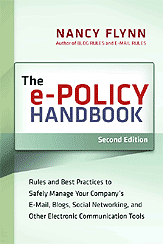|
What is Software Piracy?

|
Software piracy is the unauthorized use of software. Types of software piracy include:
1.Purchasing a single-user license then loading the software onto
multiple computers or a server. This is called softloading.
2.Making, distributing, and/or selling copies that
appear to be from an authorized source. This is called counterfeiting.
3.Renting software without permission from the copyright holder.
4.Distributing and/or selling software that has been unbundled, or separated, from the products with which it was intended to have been bundled.
5.Downloading copyrighted software from the Internet or bulletin boards without permission from the copyright holder.
|
Excerpted from The ePolicy Handbook 2001 by Nancy Flynn. Permission to reprint granted, provided the material is reproduced in its entirety and www.epolicyinstitute.com is cited as the source.
Don't Let Software Pirates Sink Your Ship
If your employees are duplicating software illegally, you could face a $150,000 fine for each copyrighted title infringed. One US gift and novelty company paid $525,000 to settle claims brought by the federal government and software industry.
In the US, one in four business software applications is illegally copied, or pirated, resulting in $3.2 billion in lost revenue for software manufacturers.
(Source: The ePolicy Handbook by Nancy Flynn, 2001.) |
How to Keep Your Workplace Free of Software Piracy
- Adopt an antipiracy stance.
- Write and implement a Software Policy.
- Notify employees that violation of the Software Policy will mean disciplinary action and/or termination.
- Educate managers and employees about copyright law.
- Audit your computers for illegal software.
- Document software purchases.
- Understand your software license agreements.
Software Policy Question of the Month
Q.
Why shouldn't I use pirated software? Who am I hurting by doing so?
A.
There are several reasons to avoid pirated software:
- It is illegal.
- It is risky. Unless you are certain your software comes from an authorized source, you could get a program that is infected with a virus, is incompatible, or is not fully functioning. Since pirated software doesn't come with a manual or technical support, you have no recourse when illegal software fails.
- You may be hurting yourself or the organization by failing to take advantage of the economic benefits of newer software licenses.
- There won't be another version of your favorite software if manufacturers, hurt by software theft, do not have the revenue to reinvest in research and development .
- Software piracy is unethical. Put yourself in the shoes of the software author, and consider how you would feel if your time and talent were stolen.
Excerpted from The ePolicy Handbook 2001 by Nancy Flynn. Permission to reprint granted, provided the material is reproduced in its entirety and www.epolicyinstitute.com is cited as the source.
Want More Information About Software Piracy?
Visit the Software & Information Industry Association's SPA Anti-Piracy Division online at www.siia.net.
The ePolicy Institute
2300 Walhaven Ct., Suite 200A
Columbus, OH 43220
614/451-3200 (phone) 614/451-8726 (fax)
experts@epolicyinstitute.com
|





